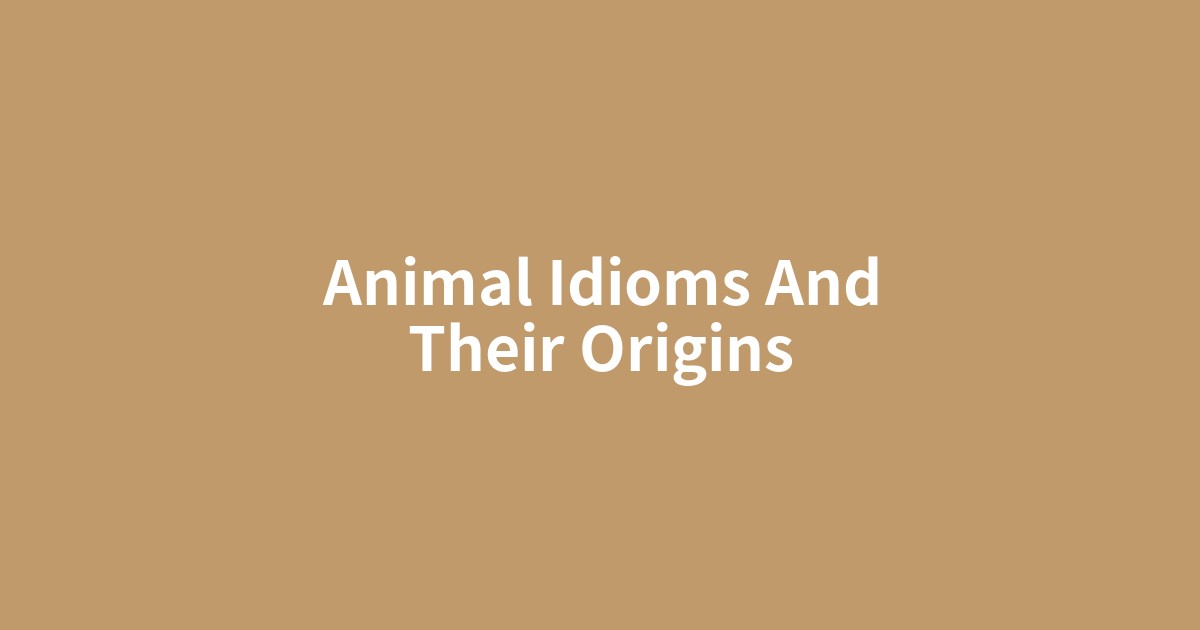このページは、歴史や文化の物語を楽しみながら、その文脈の中で重要な英単語を自然に学ぶための学習コンテンツです。各セクションの下にあるボタンで、いつでも日本語と英語を切り替えることができます。背景知識を日本語で学んだ後、英語の本文を読むことで、より深い理解と語彙力の向上を目指します。

"crocodile tears"(偽りの涙)や "a white elephant"(無用の長物)。動物のbehavior(行動)や特徴が、いかにして比喩的な表現になったか。
この記事で抑えるべきポイント
- ✓多くの英語表現が、動物の実際の生態や行動(behavior)の観察、あるいは古来の迷信や物語に由来していること。
- ✓動物に対する人々の見方(perception)や価値観が時代や文化によってどう異なり、それが言葉にどう反映されてきたか。
- ✓動物の具体的なイメージを借りることで、人間の感情や状況をより鮮明に表現する「比喩(metaphor)」の機能。
- ✓有名なイディオムの語源(origin)を探ることで、単なる暗記ではなく、物語として言語の歴史的変遷を学べること。
動物の名前から生まれた英語表現
ワニは本当に悲しくて涙を流すのでしょうか?この素朴な疑問は、英語の有名な慣用句(idiom)である "crocodile tears"(偽りの涙)へと繋がります。私たちの日常には、このように動物の名前を使った表現が数多く潜んでいます。この記事では、なぜ動物たちが人間の感情や状況を表す言葉になったのか、その背景に隠された動物と人間の豊かな関係性の歴史を探る旅へと、あなたを誘います。
English Expressions Born from Animal Names
Do crocodiles really cry because they are sad? This simple question leads us to the famous English idiom, "crocodile tears." Our daily language is filled with many such expressions using animal names. In this article, we invite you on a journey to explore the rich history of the relationship between animals and humans, hidden behind the words that use animals to describe human emotions and situations.
Crocodile Tears ― 観察から生まれた「偽りの涙」
「偽りの同情」や「空涙」を意味する "crocodile tears"。この表現の起源は、ワニ(crocodile)が獲物を食べる際に、涙のような液体を眼から分泌するという生理現象にあります。この光景が、あたかも獲物を悼んで涙を流しているかのように見えたことから、「偽りの悲しみ」という比喩的な意味が生まれました。その源流は古代ローマの文献にまで遡るとも言われています。これは、動物の実際の行動(behavior)に対する人間の観察が、時を経て新たな意味を帯びるようになった好例です。科学的な事実が、私たちの解釈によっていかにユニークな言葉を生み出すかを示しています。
Crocodile Tears - "False Tears" Born from Observation
"Crocodile tears" means false sympathy or feigned sorrow. The origin of this expression lies in the physiological phenomenon where a crocodile secretes a tear-like fluid from its eyes while eating its prey. This sight, appearing as if the crocodile were mourning its victim, gave birth to the metaphorical meaning of "false sadness." It is said that its roots can be traced back to ancient Roman literature. This is a prime example of how human observation of an animal's actual behavior can take on new meaning over time. It shows how scientific facts can generate unique language through our interpretation.
A White Elephant ― 神聖さから「無用の長物」へ
東南アジアの一部、特にタイなどでは、白い象(elephant)は神聖で幸運をもたらす存在として崇められています。しかし、英語で "a white elephant" と言うと、全く逆の「維持費ばかりかかって役に立たないもの」、つまり「無用の長物」を意味します。この奇妙な意味の変遷は、古代シャム王国(現在のタイ)の逸話に由来すると言われています。王は、気に入らない臣下に対して、罰として神聖な白い象を贈りました。贈られた側は、神聖な動物であるがゆえに丁重に扱わなければならず、その莫大な飼育費に苦しめられたのです。このように、特定の動物に対する価値観は、その文化(culture)によって大きく異なり、言葉の意味を形成する上で決定的な役割を果たすことがあります。
A White Elephant - From Sacred to "Useless Possession"
In parts of Southeast Asia, particularly Thailand, the white elephant is revered as a sacred and auspicious being. However, in English, "a white elephant" means the exact opposite: "a burdensome possession that is expensive to maintain and useless," or a "white elephant." This strange shift in meaning is said to derive from an anecdote from the ancient Kingdom of Siam (modern-day Thailand). The king would gift a sacred white elephant to a courtier he disliked as a form of punishment. The recipient, forced to treat the sacred animal with great care, was tormented by its enormous upkeep costs. Thus, the value placed on a particular animal can vary greatly depending on the culture, playing a decisive role in shaping the meaning of words.
Let the Cat Out of the Bag ― 市場の不正から生まれた「秘密の暴露」
「うっかり秘密を漏らしてしまう」ことを意味する "let the cat out of the bag"。この表現には、中世ヨーロッパの活気ある市場の光景が関係しているという説があります。当時、市場では価値の高い子豚を袋に入れて売買していました。しかし、悪徳な商人が、子豚と偽って価値の低い猫を袋に入れ、客を騙すという不正が横行していたと言われます。もし客が購入前に袋を開けてしまい、中から猫が飛び出してくれば、その詐欺は白日の下に晒されます。この表現の起源(origin)は、このような生活に根差した出来事にあると考えられており、必ずしも壮大な神話(myth)だけが言葉の源泉ではないことを教えてくれます。
Let the Cat Out of the Bag - "Revealing a Secret" Born from Market Fraud
"To let the cat out of the bag" means to accidentally reveal a secret. One theory suggests this expression is related to the lively scenes of medieval European markets. At that time, valuable piglets were sold in bags. However, it is said that unscrupulous merchants would commit fraud by putting a less valuable cat in a bag and passing it off as a pig. If a customer opened the bag before purchasing and the cat jumped out, the scam would be exposed. The origin of this expression is thought to lie in such an everyday event, teaching us that not only grand myths but also real-life situations can be the source of our language.
言葉は生き物 ― なぜ私たちは動物に例えるのか?
これまで見てきたように、動物の姿は人間の認知と深く結びついています。その理由は、動物の持つ具体的で分かりやすいイメージが、抽象的で複雑な人間の感情や状況を説明するための、極めて強力な比喩(metaphor)として機能するからです。私たちは、狡猾な人間と狐、勇敢な人間とライオンといったように、動物の行動と人間の行動の間に無意識に類似点を見出す類推(analogy)を行っています。言葉とは、私たちが世界をどう見ているかという認識(perception)を映し出す鏡なのです。これらの動物を使った表現は、世代を超えて受け継がれ、文化の中に慣用句として深く根付いています。
Language is a Living Thing - Why Do We Use Animal Analogies?
As we have seen, the image of animals is deeply connected to human cognition. The reason is that the concrete and easily understandable image of an animal functions as an extremely powerful metaphor for explaining abstract and complex human emotions and situations. We unconsciously make an analogy between animal and human behavior, such as a cunning person and a fox, or a brave person and a lion. Language is a mirror that reflects our perception of the world. These animal-based expressions are passed down through generations and become deeply rooted in culture as idioms.
結論
本稿で探ってきた動物由来の表現は、単なる言葉の遊びではありません。それらは人類の長い歴史、多様な文化、そして鋭い自然観察の積み重ねから生まれた、知恵の結晶と言えるでしょう。"crocodile tears" の背景にある古代の観察眼、"a white elephant" に込められた文化的な皮肉、そして "let the cat out of the bag" に見る庶民の生活史。今後あなたが英語のイディオムに触れたとき、その言葉の裏に隠された物語を想像してみてください。それは、単なる暗記を超えた、言語学習の新たな楽しみ方を発見するきっかけになるはずです。
Conclusion
The animal-derived expressions we have explored in this article are not just plays on words. They are crystals of wisdom born from the accumulation of human history, diverse cultures, and keen observation of nature. The ancient observational eye behind "crocodile tears," the cultural irony embedded in "a white elephant," and the history of common people's lives seen in "let the cat out of the bag." The next time you encounter an English idiom, try to imagine the story hidden behind the words. It should be an opportunity to discover a new way of enjoying language learning that goes beyond mere memorization.